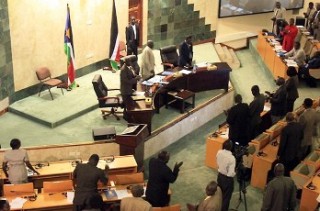South Sudan tables NGOs bill for the second time
January 19, 2016 (JUBA) – South Sudan’s justice minister has on Monday tabled a bill in the national parliament to control and regulate the work of non-governmental organizations (NGOs) for the second time since it had been withdrawn from lawmakers last year.

“There is no country where you have free lunch; you go and you do business as you want,” said Wanawilla, speaking to reporters after reading the bill to MPs in parliament.
“We also have our reservation as government because sometimes the NGOs concentrate doing the same thing in the same area and when you tell them to diversify their services – like the health services – they say ‘no.’ You cannot operate in a country under your own condition,” he said without citing a particular NGO that refused to listen to government directives.
More than two million South Sudanese affected by the conflict rely on NGOs for humanitarian services as well as education and health as the government fails to provide the services to the citizens.
The bill will empower South Sudan’s RRC – a relief arm of the government, to register NGOs, monitor them and ensure that at least 80% of NGOs staffs are South Sudanese.
The minister dismissed suggestions that the government is targeting certain NGOs, including the civil society organizations that are critical of the government.
“Now, there will be a registrar appointed by SSRRC who will be able to register all the NGOs operating in South Sudan under the NGOs bill without exception,” he said.
Members of civil society and NGOs complained in the past that the bill will impede humanitarian outreach in the country.
The bill was first introduced in parliament last year, passed by the parliament but President Salva Kiir declined to sign it.
Wanawilla said there are two bills, which were contained in single bill last year, are supposed to be different according to the law.
Meanwhile, opposition leader in parliament, Onyoti Adigo Nyikuac, who represents the Democratic Party (DC) led by Lam Akol, has criticized President Kiir’s government for rushing to deliberate the bill without participation of members of the armed opposition faction of the Sudan People’s Liberation Movement (SPLM-IO), under the leadership of former vice president, Riek Machar.
Additional 50 members of the SPLM-IO were appointed to the parliament in addition to their former members in the August House who should be reinstated so that the parliament is reconstituted and expanded to collectively deliberate on laws after the peace agreement.
MPs will discuss the bill on Monday next week after being studied by legal committee.
(ST)
